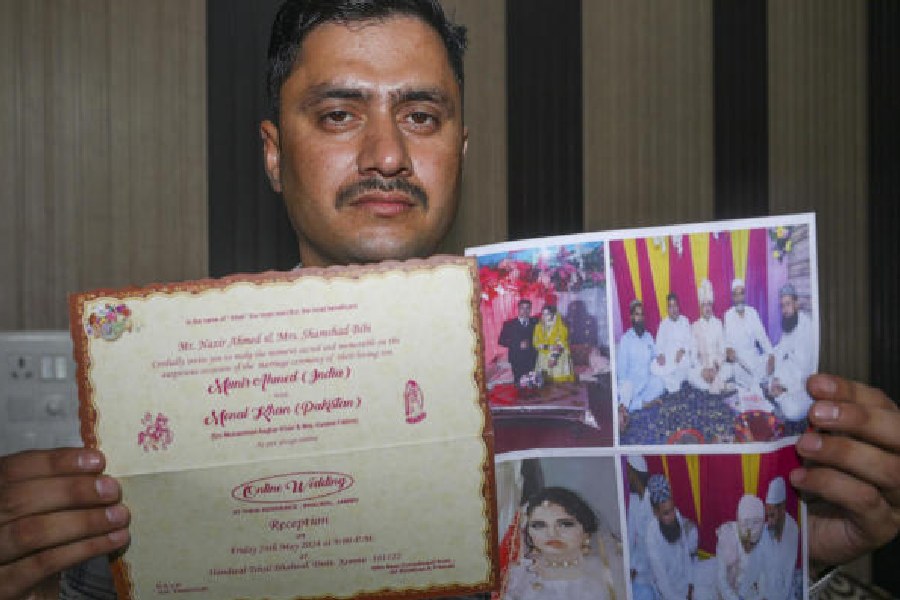New Delhi, May 23: The national capital is increasingly becoming a city of broken dreams. The bulk of its workforce in the domestic sector — maids, babysitters, cooks and washerwomen — are tribal girls mostly from Jharkhand, besides Bengal, Odisha and Assam, and none of them is happy with jobs that more often than not demean their dignity.
At a weekly meeting of the Domestic Workers’ Forum (DWF) — a union of about 3,000 maids in the national capital region organised with help from the Catholic Church — some of these young women from Jharkhand poured their hearts out on routine humiliation. Almost all of them want to go back to school or plough fields and win back self-respect.
They also have a simple and precise suggestion for their mukhyamantriji (chief minister): create jobs back home.
The DWF has members of all faiths, but most attend church services on Sundays. The practice serves as a cover from their tormenting employers and an excuse to attend meetings, study, sing and get bare minimum healthcare. Many church-run institutions in Delhi are part of this network. St Columba’s School in central Delhi is one such rendezvous where these girls meet in the basement of an auditorium for eight hours every Sunday.
Ironically, it was nuns who had brought one of these many maids — Suman Toti of Khunti — to Delhi in 2002 when she was only 14. “I dropped out of school after Class V and joined stitching classes run by nuns. There were financial problems and I couldn’t pay the fees. They told me that if I wanted work, I could go to a convent in Delhi. I am the eldest of five sisters and a brother. What choice did I have?” Suman said.
After coming to Delhi and working at a convent for a while, a nun asked her to manage chores for a family. “The convent was good, but at the house I got nothing but abuses. Even if you bring up their children as your own, they treat you like a thief. They did not beat me, but gave me stale food,” she said. Ten years and many jobs later, Suman’s salary has increased from Rs 1,800 to Rs 5,000 a month.
Karuna Solle, also from Khunti, was brought to Delhi by a placement agency three years ago. “They paid my father Rs 7,000. Another girl from our village had also got a job. I did not know Hindi and could not roll rotis. I was thrashed with a rolling pin. One day, the landlady lost the keys and I was blamed. They pushed me down the stairs and said they would put me in jail. I swept the entire house and found the keys. And still they blamed me,” the 21-year-old said.
Karuna’s life in Delhi was just one long train of tragedies. Her placement agency robbed her entire savings of Rs 10,000. Her family was told that she had eloped with someone. When she went back to her village two years ago, the elders made her return to the city with her younger brother and find him a job. This time, it was another agency that placed the brother-sister duo in different homes. Their employers did not let them meet for six months. When they finally did, her brother was bruised all over and had lost his sanity.
“One night, I left with him for New Delhi station. I told him to wait, while I go buy a ticket. When I came back, he was gone. I lost my brother. It was my fault. I should’ve never let him come here. This place is hell,” she said. With DWF to her aid, Karuna now works with a written contract and does not get beaten up. But she chokes with a misplaced sense of guilt when asked for her brother’s name.
Pirti Kujur of Simdega said the Jharkhand government had many a scheme for tribal women, but the money dried up before reaching them. “No one likes domestic work, but agriculture alone can’t feed hungry mouths. I request Mundaji to monitor state schemes and weed out corruption. Mundaji, please create jobs for illiterates like me. We can work hard even if we can’t read.”
Khunti’s Salomi Topno said the government could help market their mushrooms and other exotic grub grown by self-help groups. “We get good yield, but no market. If mukhyamantriji (chief minister) asks his officers to take our produce to city markets, we won’t have to come to Delhi.”
According to Kamal Chand, a DWF organiser, most placement agencies are fake or rogue. “Often, women are forced into the flesh trade. They are sold from one family to the next. If rescued, police refuse to accept they were trafficked unless they are minors. The truth is that they agree to come for domestic work, but end up as bonded labourers or prostitutes. Many are ashamed to go home after being rescued. If we can’t send them home, we help them find work again but on legal contracts and keep a check,” Chand said.
DWF uses a network of domestic helps to track girls who are being abused. If necessary, they face the employer and threaten legal proceedings if the victim is not released. “Police, usually, believe the employer. There is very little co-operation. We are able to rescue the girls, but they lose out on their dues from the employer,” said Maxima Ekka, who leads rescue teams of the DWF.
NGOs like DWF have rescued more than 50 young girls in Delhi in 2012 alone. In the last two months, two cases of torture and confinement of girls from Jharkhand have made headlines in the national capital. But unless there’s work back home, young Adivasi girls from Simdega, Khunti, Hazaribagh and Seraikela will continue to flock Delhi, putting their honour — and survival — at stake.










